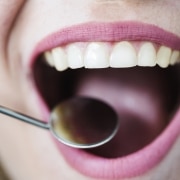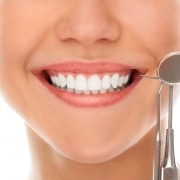We all know that practicing good oral hygiene is essential for maintaining the health of our teeth and gums, however, besides ensuring you have a beautiful smile, good oral hygiene offers a variety of other health benefits.
How Good Oral Hygiene Benefits the Teeth and Gums
Good oral hygiene reduces the risk of developing potentially painful issues like cavities (aka dental caries) and gingivitis (aka periodontal disease and gum disease).
Gingivitis is the first stage of gum disease. If left untreated, the disease continues to progress, causing permanent damage to the teeth, gingival tissue (i.e., gum tissue), and even the jawbone.
Signs of tooth decay include:
- Surface stains.
- Tooth sensitivity. This sensitivity is frequently associated with temperature changes and consuming foods and beverages that are highly acidic (e.g., oranges, lemons, limes, etc.).
- Tooth pain.
- Pits or holes in the teeth.
There are four levels of gum disease:
- Gingivitis.
- Slight periodontal disease.
- Moderate periodontal disease.
- Advanced periodontal disease.
Early symptoms include inflamed gingival tissue, irritation, redness, and bleeding while brushing. Any damage incurred during this early stage can be reversed, however, damage resulting from the other three cannot.
Symptoms experienced during the more serious stages of gum disease:
- A receding gumline.
- Red gums that are swollen and tender.
- Loose or shifting teeth.
- A bad taste remains in the mouth.
- Halitosis (i.e., chronic bad breath).
- Pockets of pus at the gumline.
5 Other Potential Benefits Associated with Eliminating Bacteria by Practicing Good Oral Hygiene
- May Help Prevent the Onset of Dementia and Alzheimer’s
Studies indicate that individuals with gum disease experience more issues related to cognitive skills and memory than people with healthier mouths. It is believed that the oral bacteria enter the nerve channels and bloodstream leading to the brain, once there, the bacteria kill brain cells, resulting in the development of Alzheimer’s disease and dementia.
- Can Decrease the Likelihood of Developing Cardiovascular Problems
Once gingivitis develops and the gums begin bleeding, oral bacteria can enter the bloodstream, allowing it to spread throughout the body, increasing chronic inflammation. This inflammation can lead to a variety of cardiovascular problems including heart disease and stroke.
- May Improve a Woman’s Fertility
A study conducted in 2014 found that when a woman has gum disease, it will take her longer to conceive than a woman with healthy teeth and gums.
- Decreases the Likelihood of Developing Type 2 Diabetes
It is believed that, once again, the oral bacteria that enter the bloodstream increase widespread inflammation, leading to insulin resistance.
- Reduces the Risk of Some Cancers
The oral bacteria that enter the bloodstream may actually boost cancer cell growth. In addition, individuals with gum disease may be at an increased risk of developing oral or pancreatic cancer.
How to practice good oral hygiene:
- Brush twice a day, in two-minute intervals.
- Use a soft-bristled toothbrush with a fluoride toothpaste that has the ADA’s Seal of Approval.
- Floss at least once a day.
- Use a mouthwash recommended by the ADA.
- Limit sugar consumption.
- Avoid using tobacco.
- Have biannual cleanings and exams at Travis Wilson Family Dentistry.
If you are in the greater Beaver Dam area, Morgantown or Owensboro, Kentucky, and you are experiencing any of the symptoms associated with gum disease or you are due for a dental cleaning and exam, contact Travis Wilson Family Dentistry today to schedule an appointment with an experienced and caring dentist.
Travis Wilson Family Dentistry has offices located at 2014 Triplett Street in Owensboro, Kentucky, and at 1042 North Main Street in Beaver Dam, Kentucky. You can either use our online appointment request form, or contact the office of your choice via telephone. To contact our Owensboro, Kentucky, office please call: (270) 926-6040. To call our Beaver Dam, Kentucky, office, please dial (270) 274-3645.










